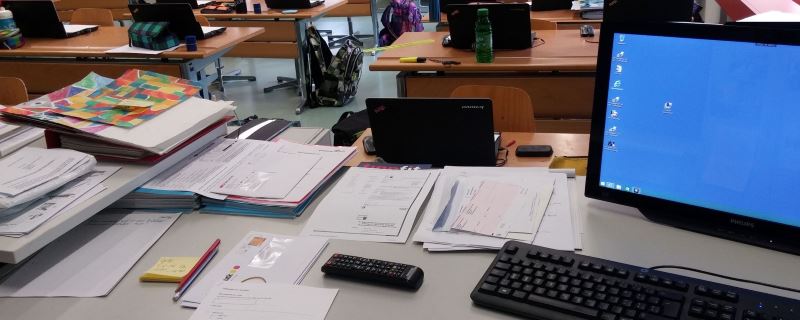Short portrait
Research on teaching deals with theories and models for effective teaching. It offers teachers a scientifically based knowledge of action and reflection for planning, carrying out, evaluating and improving their lessons. With its interdisciplinary approach, it contributes to understanding across subject boundaries. It has many disciplinary references, from educational theory to empirical teaching and learning research. It cooperates with the fields of subject specific methodologies and teaching methods for school subjects in order to develop teaching holistically.
Educational Technology develops guidelines for the deliberate use of tools in teaching and learning contexts. This includes the development and selection of technology for teaching and learning, the planning of technology-supported teaching units as well as their implementation and empirical testing. A special focus is on digital teaching and learning technologies. Ideally, the use of such technology should make teaching more vivid, activating, motivating and ultimately more effective. Furthermore, learners should be enabled to use these technologies in a self-determined, competent and responsible manner.
Research topics
In particular, our research focuses on the following topics:
Teaching methods and teachers’ beliefs;
Personalized teaching and learning methods;
Integration of educational technology in schools;
Information literacy and media literacy education;
Technology in teacher education: mobile note taking and reflective writing;
Serious games and gamified learning.
Recent publications
- Brianza, E., Schmid, M., Tondeur, J., & Petko, D. (2024a). Is contextual knowledge a key component of expertise for teaching with technology? A systematic literature review. Computers and Education Open, 100201.
https://doi.org/10.1016/j.caeo.2024.100201
- Brianza, E., Schmid, M., Tondeur, J., & Petko, D. (2024b). The digital silver lining of the pandemic: The impact on preservice teachers’ technological knowledge and beliefs. Education and Information Technologies, 29(2), 1591–1616.
https://doi.org/10.1007/s10639-023-11801-w
- Désiron, J. C., Schmitz, M.-L., & Petko, D. (2024). Teachers as Creators of Digital Multimedia Learning Materials: Are they Aligned with Multimedia Learning Principles. Technology, Knowledge and Learning, 1–17.
https://doi.org/10.1007/s10758-024-09770-1
- Gonon, P., Schmitz, M.-L., Petko, D., & Consoli, T. (2024). Von der Digitalisierung zur digitalen Transformation. Transfer. Berufsbildung in Forschung Und Praxis, 9(1), Online.
https://transfer.vet/von-der-digitalisierung-zur-digitalen-transformation/
- Michos, K., & Petko, D. (2024). Reflection using mobile portfolios during teaching internships: Tracing the influence of mentors and peers on teacher self-efficacy. Technology, Pedagogy and Education, 1–21.
https://doi.org/10.1080/1475939X.2024.2311798
- Schmid, M., Brianza, E., Mok, S. Y., & Petko, D. (2024). Running in circles: A systematic review of reviews on technological pedagogical content knowledge (TPACK). Computers & Education, 105024.
https://doi.org/10.1016/j.compedu.2024.105024
- Schmitz, M.-L., Consoli, T., Antonietti, C., Cattaneo, A., Gonon, P., & Petko, D. (2024a). Examining 21st century skills in BYOD schools: From programs to practice. Zeitschrift Für Bildungsforschung, 1–24.
https://doi.org/10.1007/s35834-024-00425-w
- Schmitz, M.-L., Consoli, T., Antonietti, C., Cattaneo, A., Gonon, P., & Petko, D. (2024b). Why do some teachers teach media literacy while others do not? Exploring predictors along the “will, skill, tool, pedagogy” model. Computers in Human Behavior, 151, 108004.
https://doi.org/10.1016/j.chb.2023.108004
- Antonietti, C., Schmitz, M. L., Consoli, T., Cattaneo, A., Gonon, P., & Petko, D. (2023). Development and validation of the ICAP Technology Scale to measure how teachers integrate technology into learning activities. Computers & Education, 192, 104648. https://www.sciencedirect.com/science/article/pii/S0360131522002196
- Antonietti, C., Schmitz, M.L., Consoli, T., Cattaneo, A., Gonon, P. & Petko, D. (2023). More formal, please! The impact of teachers’ formal and independent professional development on the quality of technology integration. In E. Langran, P. Christensen & J. Sanson (Eds.), Proceedings of Society for Information Technology & Teacher Education International Conference (pp. 2392-2397). New Orleans, LA, United States: Association for the Advancement of Computing in Education (AACE). https://www.learntechlib.org/primary/p/222136
- Brianza, E., Criblez, L., Haymoz, N. & Petko, D. (2023). Gymnasien entwickeln sich weiter: Aktuelle Trends in der Schweiz. Zürich: Universität Zürich.
https://www.zora.uzh.ch/id/eprint/251808/1/GH_2023_05_d.pdf
- Brianza, E., Schmid, M., Tondeur, J., & Petko, D. (2023). Comparing TPACK of novices, experienced preservice teachers, and inservice teachers: Disentangling the effects of teaching experience from formal training. In E. Langran, P. Christensen & J. Sanson (Eds.), Proceedings of Society for Information Technology & Teacher Education International Conference (pp. 2412-2420). New Orleans, LA, United States: Association for the Advancement of Computing in Education (AACE). https://www.learntechlib.org/primary/p/222139/.
- Brianza, E., Schmid, M., Tondeur, J., & Petko, D. (2023). The digital silver lining of the pandemic: The impact on preservice teachers’ technological knowledge and beliefs. Education and Information Technologies, 1-26. https://doi.org/10.1007/s10639-023-11801-w
- Consoli, T., Desiron, J., & Cattaneo, A. (2023). What is “technology integration” and how is it measured in K-12 education? A systematic review of survey instruments from 2010-2021. Computers & Education, 197, 104742https://doi.org/10.1016/j.compedu.2023.104742
- Désiron, J. C., & Petko, D. (2023). Academic dishonesty when doing homework: How digital technologies are put to bad use in secondary schools. Education and Information Technologies, 28(2), 1251-1271. https://doi.org/10.1007/s10639-022-11225-y
- Michos, K., Schmitz, M. L., & Petko, D. (2023). Teachers’ data literacy for learning analytics: a central predictor for digital data use in upper secondary schools. Education and Information Technologies, 1-19. https://link.springer.com/article/10.1007/s10639-023-11772-y
- Petko, D., Cantieni, A., Schmid, R., Müller, L., Krannich, M., & Michos, K. (2023). Technology acceptance of a mobile portfolio app for teacher education: Pre-service teachers views on multimedia-based note-taking and mentoring in internships. Journal of Digital learning in teacher Education, 39(1), 57-71. https://doi.org/10.1080/21532974.2022.2142990
- Schmitz, M. L., Antonietti, C., Consoli, T., Cattaneo, A., Gonon, P., & Petko, D. (2023). Transformational leadership for technology integration in schools: Empowering teachers to use technology in a more demanding way. Computers & Education, 204, 104880. https://doi.org/10.1016/j.compedu.2023.104880
